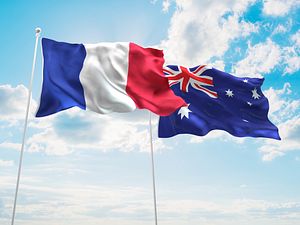“The French are a very strong member of NATO. In times past Australia has been the most intimate ally of France, we are currently working together with the French in the Middle East in the campaign against this evil caliphate, I think France is very much on the same strategic page as Australia. They want us to have the strongest most effective submarine force.”
That is a substantial vote for France and it was one of the first by an Australian politician on the importance of the relationship between Australia and France since the conclusion of the Competitive Evaluation Process (CEP) for the contract to build Australia’s next submarine fleet. It came from an unlikely source: former Australian Prime Minister Tony Abbott. Abbott was so heavily in favor of the Soryu option that he almost promised Japan the contract with no CEP. He was speaking to columnist Andrew Bolt and was pushed on whether Australia could really trust the French.
His warm sentiment seems to be shared by the French. Denise Fisher at the Lowy Institute wrote, “In private comments to me yesterday, one senior French official noted with some emotion the timing of advice of the granting of the contract, on Anzac Day in the French capital, underlining the poignant historic foundations of the renewed Australian-French relationship that rests on the shared sacrifice of the past.”
Australia’s relations with France relations do go far back, to World War One and the Western Front, but they are based on more than blood and history. In fact, this is not Australia’s first buy from France: France supplied its Dassault Mirage aircraft to Australia from 1964 on, though they were retired in the 1980s and replaced by McDonnell Douglas F/A-18 Hornets, an American plane. In this earlier contract, the first Australian iterations of the fighter jets were built and flown in France. The submarines will all be built in Australia, something that’s largely seen as another part of the government’s domestic policy concerns.
“It is an industrial and economic partnership. It is also a partnership that binds us for a very long time on other issues, including security and defense,” said French PM Manuel Valls on a quick trip to Canberra that revealed no new details.
Trade may be in a deficit and somewhat negligible – Australia imports goods worth A$6 billion ($4.5 billion) from France, and exports A$1 billion – compared with China or the rest of Asia, but strategic cooperation in the region is going to be increasingly important. France is virtually the only European nation with territorial interests in the Pacific, part of Australia’s backyard. (Britain has the distant Pitcairn Islands.) Thanks to many of its overseas territories France actually has the world’s second-largest Exclusive Economic Zone, and China’s actions in the South China Sea moves have been used by France “to justify proposals to restructure its base network in the Pacific islands,” according to Nic Maclellan at Lowy back in 2010. Australia and France also explore for oil and gas reserves together, given that their maritime areas are adjacent.
Cooperation in the area is going to be important; in fact some maritime boundaries are yet to be decided upon, based upon some underwater features. The New Caledonian referendum will have implications for the region.
Overall this has been a good deal for both sides it seems and for France, looking to the New Caledonian referendum, it is also a useful way to stay in an area where it has strong maritime interests, even if a submarine deal is not really a base.
Or as the glossy booklet that tried to seal the deal (The Most Advanced Submarine You’ll Never See) “Our shared military heritage provides a solid foundation for a new endeavour to further strengthen this time honoured relationship.”

































